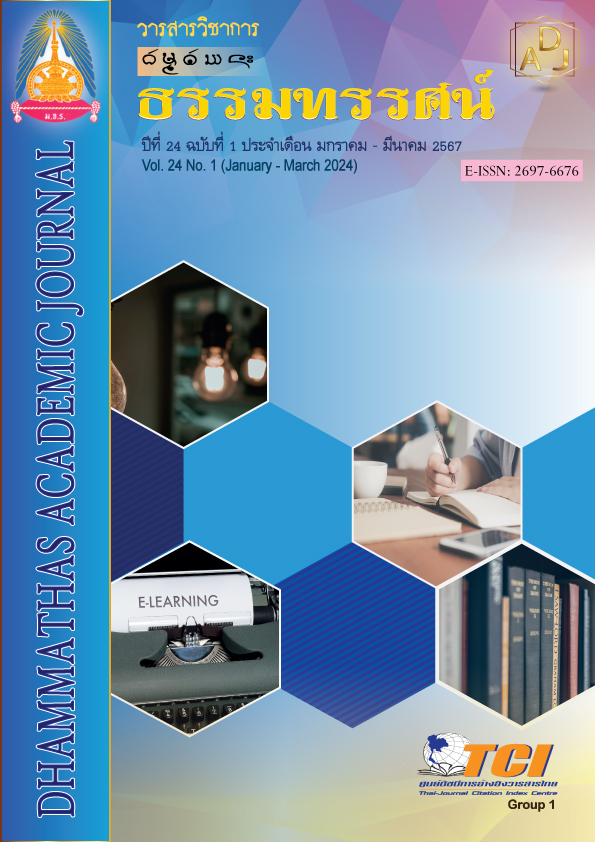A Model for Developing Online Learning Management with Creative Innovation in the Situation of Next Normal of Schools in Khon Kaen Province
Main Article Content
Abstract
This research has a purpose to study the condition to study the pattern and to present a model for developing online learning management with creative innovation in the NEXT NORMAL situation of schools in Khon Kaen Province. This is qualitative research, which is a focus group or an in-depth interview using a purposive sampling method. Key Informants: 20 administrators and teachers who provide information for focus group meetings: 10 administrators and teachers. The tools are: in-depth interview and group discussion issues. Group data analysis by content analysis method and inductive analysis (Analytic induction) by interpretation link relationship and draw conclusions from the data analyzed.
The results of the research found that: Creative online learning management In NEXT NORMAL situations, most schools will use the teaching system in the form of learning through Microsoft Teams, Google Hangouts Meet, Zoom Cloud Meetings, Line, Facebook Live. in learning management such as website, PowerPoint, YouTube, ZOOM, Google Classroom as appropriate for teaching and learning Through the tools are computers, notebooks, tablets, smartphones and the Internet. according to the context, space and readiness of students and parents to use the device. A model for developing online learning management with creative innovation. Teaching activities can be divided into 3 types: Teach by letting children learn from pictures 50% (Visual), Taught by having children learn by listening 38% (Auditory) Teach by letting children learn from practice 12% (Kinesthetic). Organizing learning activities through online systems the teachers use the Online Learning App model as appropriate for the context of the students and the context of each school in order to be effective in teaching and learning management resulting in academic achievement in normal circumstances.
Article Details

This work is licensed under a Creative Commons Attribution-NonCommercial-NoDerivatives 4.0 International License.
เพื่อให้เป็นไปตามกฎหมายลิขสิทธิ์ ผู้นิพนธ์ทุกท่านต้องลงลายมือชื่อในแบบฟอร์มใบมอบลิขสิทธิ์บทความ ให้แก่วารสารฯ พร้อมกับบทความต้นฉบับที่ได้แก้ไขครั้งสุดท้าย นอกจากนี้ ผู้นิพนธ์ทุกท่านต้องยืนยันว่าบทความ ต้นฉบับที่ส่งมาตีพิมพ์นั้น ได้ส่งมาตีพิมพ์เฉพาะในวารสาร วิชาการธรรม ทรรศน์ เพียงแห่งเดียวเท่านั้น หากมีการใช้ ภาพหรือตารางของผู้นิพนธ์อื่นที่ปรากฏในสิ่งตีพิมพ์อื่นมาแล้ว ผู้นิพนธ์ต้องขออนุญาตเจ้าของลิขสิทธิ์ก่อน พร้อมทั้ง แสดงหนังสือที่ได้รับการยินยอมต่อบรรณาธิการ ก่อนที่บทความจะได้รับการตีพิมพ์References
กฤษณา สิกขมาน. (2554). การศึกษาผลสัมฤทธิ์ทางการเรียนรายวิชาการสื่อสารภาษาอังกฤษธุรกิจโดยการใช้การสอนแบบ E-Learning. (รายงานการวิจัย). กรุงเทพฯ: มหาวิทยาลัยศรีปทุม.
ชาลิสา จิตบุญญาพนิจ และคณะ. (2559). ผลการเรียนรู้และผลสัมฤทธิ์ทางการศึกษาในการพัฒนารูปแบบการเรียนการสอนโดยใช้บทเรียนอีเลิร์นนิ่งในรายวิชาเทคโนโลยีสารสนเทศสำหรับนักเรียนมัธยมศึกษาปีที่ 1. การประชุมวิชาการระดับชาติและนานาชาติ มหาวิทยาลัยศรีปทุม ครั้งที่ 11, 21 ธันวาคม 2559, (หน้า 123-131). กรุงเทพฯ: มหาวิทยาลัยศรีปทุม.
พระสมพล กิตติเมธี (เชื้อกล้า). (2563). การจัดการเรียนรู้ออนไลน์ในยุคดิจิทัล รายวิชาหน้าที่พลเมือง วัฒนธรรม และการดำเนินชีวิตในสังคมของนักเรียนชั้นมัธยมศึกษาตอนต้น โรงเรียนคอนสารวิทยาคม จังหวัดชัยภูมิ. (วิทยานิพนธ์ครุศาสตรมหาบัณฑิต). พระนครศรีอยุธยา: มหาวิทยาลัยมหาจุฬาลงกรณราชวิทยาลัย.
พิมพ์พันธุ์ เตชะคุปต์ และพเยาว์ ยินดีสุข. (2557). การจัดการเรียนรู้ในศตวรรษที่ 21. กรุงเทพฯ: จุฬาลงกรณ์มหาวิทยาลัย.
เล็กฤทัย ขันทองชัย. (2560). การพัฒนารูปแบบระบบสนับสนุนการวางแผนจัดการเรียนรู้ออนไลน์ โดยใช้รูปแบบการสอน MIAPCED เพื่อส่งเสริมทักษะการสอนในศตวรรษที่ 21 ของนักศึกษาฝึกสอนกลุ่มวิชาคอมพิวเตอร์. (วิทยานิพนธ์ปรัชญาดุษฎีบัณฑิต). กรุงเทพฯ: มหาวิทยาลัยเทคโนโลยีพระจอมเกล้าพระนครเหนือ.
วรวุฒิ อ่อนน่วม. (2560). รูปแบบรายการโทรทัศน์และการผลิตรายการโทรทัศน์ต้นแบบ สำหรับเด็ก เยาวชน และครอบครัว. การประชุมวิชาการระดับชาติ มหาวิทยาลัยรังสิต ประจำปี 2560 (RSU National Research Conference 2017), 28 เมษายน 2560, (หน้า 724-735). กรุงเทพฯ: มหาวิทยาลัยรังสิต.
สำนักงานเลขาธิการสภาการศึกษา. (2560). แผนการศึกษาแห่งชาติ พ.ศ. 2560-2579. กรุงเทพฯ: พริกหวานกราฟฟิค.
อัมพร พงษ์กังสนานันท์. (2554). การปฏิรูปการศึกษาเพื่อการพัฒนาที่ต่อเนื่อง. วารสารการศึกษาไทย, 8(82), 3-7.
BBCNEWs. (2564). ไวรัสโคโรนา: รัฐบาลประกาศภาวะฉุกเฉินทั้งประเทศ 26 มี.ค.- 30 เม.ย. สกัดโควิด-19 ยังไม่สั่ง “ปิดประเทศ-ปิดเมือง-ปิดบ้าน”. เข้าถึงได้จาก https://www.bbc.com/thai/thailand-52030713

